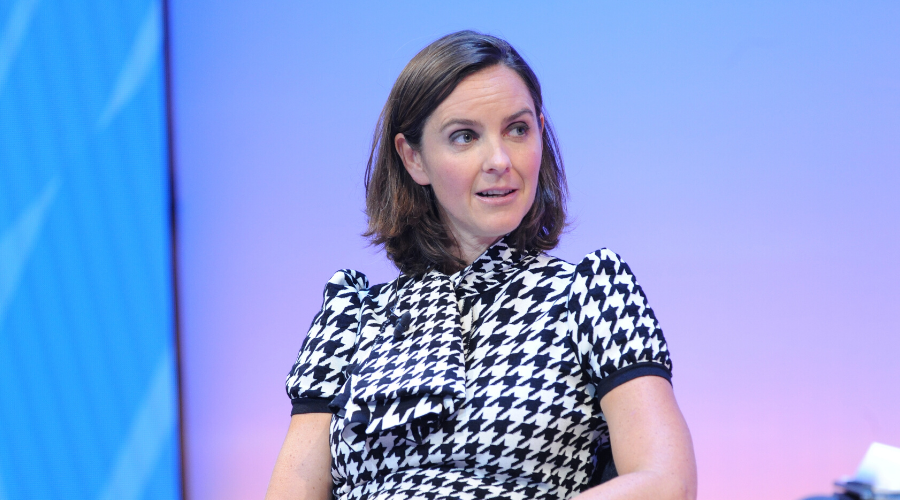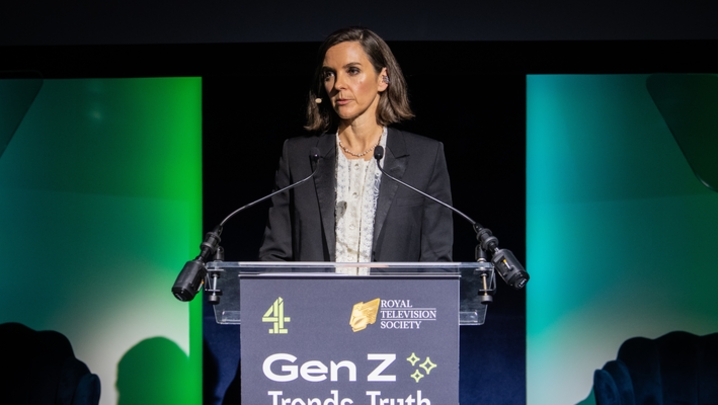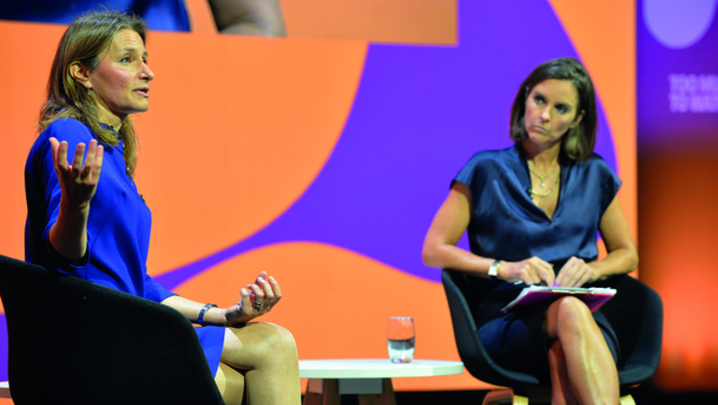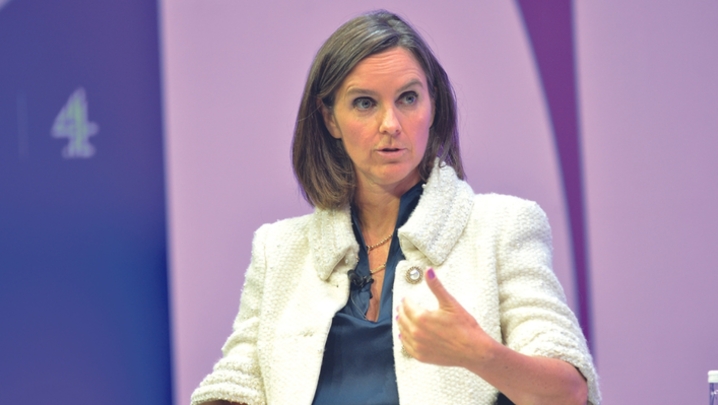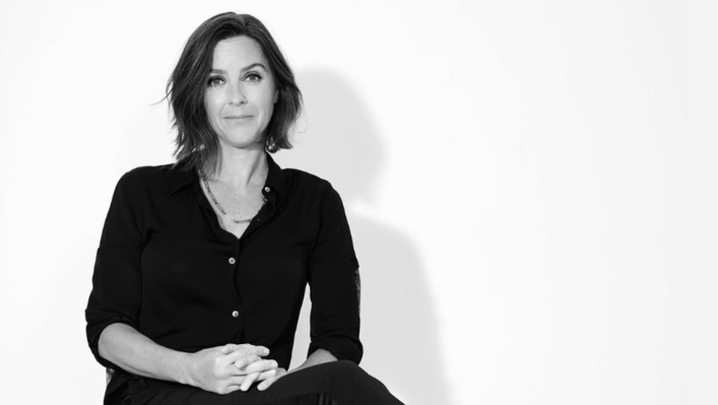The Channel 4 CEO argues that PSBs need supportive regulation to protect local voices that reflect UK viewers’ lives
CEO Alex Mahon made a forthright defence of Channel 4’s place within television’s new ecosystem. She said that channels such as hers were “a vital counterweight to the growing concentration of power that is in the hands of just a few tech behemoths, [which] increasingly decide what we read, what we watch and what we listen to”.
Mahon highlighted the importance of Channel 4’s programmes, which added “piquancy to large domestic audiences”. She said that they resonated “in a way that’s important and big enough to be important to our whole society”.
However, in today’s TV, “the direction of travel is not local, it’s about scale, it’s about control… to be the biggest… getting content to work trans-territory, scaling it around the world with as little need to adapt it” as possible.
Now two years into her new role, the former CEO of Shine Group and Foundry said in her keynote speech at Cambridge that, from some angles, TV production seemed to be following the same model as the global food and drinks industry. It was prioritising “simplicity”, and was exporting the “same recipe to lots of different markets”.
“Don’t get me wrong,” she added, it was a “successful model” that had “funded a golden age of television.” However, she went on, “as viewers, perhaps we should be wary of a future that is controlled by the biggest players in tech”, with people consuming content on Android or via Alexa.
Mahon explained: “When it’s something such as Orange Is the New Black or When They See Us or Stranger Things, it’s great. When the streamers are good, they’re very, very good.” But, alongside those titles, she maintained, there was a “lot of the same”, such as docu-series Drug Lords. Her key concern was that “the television of our future will not, and is not being designed to, reflect Britain back to itself – to bring the nation together at particular moments, to inform and educate a particular society or to care about any kind of social cohesion”.
She acknowledged that “people [in TV] tend to dismiss something that is local [as] quaint, a little bit retro” and assumed it “to be parochial”, and lacking heft and relevance.
But, argued the Channel 4 boss, in many other areas of business, “the focus of growth is in fact on localism… universal meaning and universal fascination – a return to craft, to the atelier, the boutique... it doesn’t depend on scale to succeed”.
Such programmes grew because of their independence and “grass-roots” appeal, she said, and could be successful when they expanded their appeal, [exporting it] “beyond each locality” to “become general”.
Mahon reminded the audience that, although “the direction of travel in television is generally global”, each territory was an aggregate of “a collection of multiple smaller landscapes.… Each one is relevant to itself and often to its neighbours; each containing something important not just to those within it but also universal.”
‘We are the youngest-skewing public service broadcaster in the world’
To streamers, all of Britain was “just one of many locals”, she insisted, but Channel 4 could give a national platform to “untold tales and unheard voices” and take new talent or new brands “from obscurity to national visibility”, where – as in the case of Black Mirror and Top Boy – they were then snapped up by Netflix.
“The need for us is greater than ever,” said Mahon, adding: “We are the youngest-skewing public service broadcaster in the world.” But she acknowledged this meant being “more responsive” to the rapidly changing demands and fears of young audiences growing up in a period of economic and political instability, while being available “where they want”.
Quizzed by John Hardie after her speech, the former ITN CEO voiced the concern of some that, in an age where rights were king, Channel 4’s business model put it at a disadvantage. He said Ofcom had noted that the risks to the broadcaster’s sustainability were growing, citing “the pincer” of global giants and the volatility of the advertising market as threats.
He also recalled how Channel 4 had helped to build brands such as Black Mirror, asking: “Even if those producers decide to leave you, having made them famous, shouldn’t you be able to participate in the long-term wealth you’ve helped create?”
Mahon responded: “We have a rights deal with [producers body] Pact, and with indies and suppliers that we participate in, but just not at the same level as if we were producers. On the other hand, we’re not weighed down with having to run the large production part of that.
“The main issue about diversification for us is about exposure to the advertising market; it’s not necessarily about rights ownership and… missing the profits of rights ownership.”
She said that public service broadcasting was more important than ever as a trusted source, arguing that, on YouTube, “viewing is fragmented and siloed, and the content is largely unfiltered and often of a different calibre.… It can sit alongside the misleading, the dishonest and, at times, the harmful.”
A prime example of how local mattered to viewers was Brexit, said Mahon – an issue not of great concern to global streamers, “given the low likely demand for that content outside the UK”, but of huge importance to PSBs, “as Brexit will shape the life of everyone in the UK, and the younger generation in particular”.
Referring to Channel 4’s drama Brexit: The Uncivil War, she said: “In this age of Brexit, there is much criticism of being inward-looking… but if you don’t reflect people’s lives to them by entering their own personal landscapes and drawing the universal out of them”, then broadcasters risked irrelevancy.
Mahon agreed with Hardie that, “our job is to make sure the barriers to entry for new talent in the UK TV sector are low”, and companies should expound diversity. But she disagreed with his notion that Dorothy Byrne’s MacTaggart Lecture this summer, in which Channel 4’s head of news and current affairs described Boris Johnson as “a known liar”, meant that “Channel 4 was now back in the cross hairs of certain Tories”, saying: “I don’t think the ghost of privatisation is there, no.”
‘[Prominence is] the biggest win we can have in terms of regulation’
Mahon concluded that Channel 4 and the other PSBs could be “authentically local, powerfully national and genuinely international”, but needed support from the government and Ofcom to achieve things such as prominence on the new platforms.
“I’m asking for assistance to ensure that our framework is up to date for the digital age.
“The EPG [electronic programme guide] regime was developed 20 years ago and that’s the last time legislation was updated. At this stage, as broadcasters, we have no protection for how our content is sourced on an Amazon Fire Stick or Samsung smart TV, or on any other device you might use to bypass an EPG and access content. That’s the biggest win we can have in terms of regulation.
“If we wait three years or five years for that, we will have sleepwalked into an age where public service has declined in this country.”
In Session Eleven, ‘Keynote – Alex Mahon’, the CEO of Channel 4 was interviewed by John Hardie, former ITN CEO and editor-in-chief. The producers were Sue Robertson and Martin Stott. Report by Tara Conlan.

